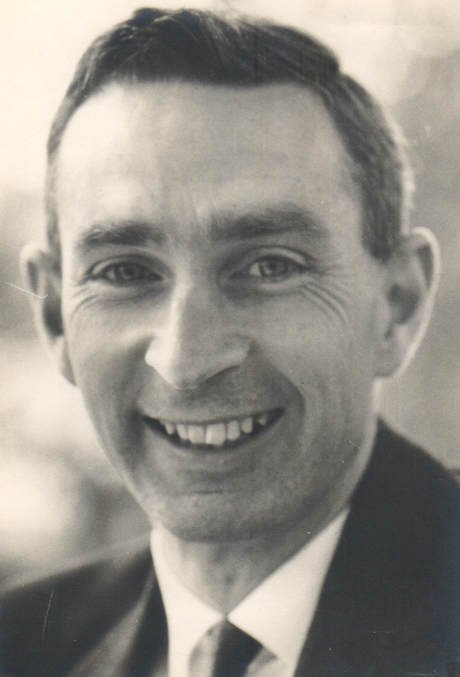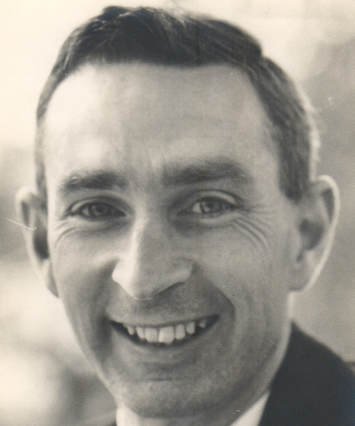Given at his funeral on December 13, 1990
When Fiona invited me to speak about Geoffrey today, I wasof course touched and honoured. So many friends could wellhave been asked before me.
We first met up after the Second World War. I had returned to Europe from Australia, having been an RAAF pilot over here. Geoffrey had been in the Coldstream Guards and looked it. Then, over the years, we had a close association in India, in Bangla Desh, Australia, the Philippines and Vietnam as well as the United States and in Europe.
Last weekend, at the conclusion of a national conference in Cheshire, many friends paid tribute to Geoffrey. Several used the same words about him - "Selfless" and "Professional". He was both. He was an informed and scholarly man, educated at Charterhouse and an Oxford scholar. He was a gifted linguist too, but he wore his learning lightly. He was preparing for a life in the Foreign Office when he had a calling to his life's work with Moral Re-Armament.
A relative wrote, "Not many people throw up everything in life for an ideal. That he certainly did - and unstintingly.
A former British Ambassador, Archie Mackenzie, said in a message to Fiona, "Geoffrey was God's diplomat. Just think what he did in and for Germany and India compared with an ordinary diplomat in a posting to those countries. Such a spirit never dies - just strides on ahead."
Later, the Daukes' diplomatic parties in 45 Berkeley Square and 26 Catherine Place and the Westminster Theatre were not only perfection in their mounting and their hosting but made a considerable contribution to international relations at a variety of levels. Fiona hosted a diplomatic ladies lunch for 50 a month ago, as it had been planned for some time.
In the 1950s, he and I hosted a towering German named Karl Albrecht, a former Soviet Deputy Commissar, who was given to making one and two hour speeches, which Geoffrey rendered into English with meticulous care and endless patience. Albrecht said Geoffrey saved his life at a critical moment.
We had some amusing moments in Asia, occasioned by his knowledge of languages. We were in Saigon, then the capital of South Vietnem, when Ngo Dinh Diem was President. I knew the President's Chef du Cabinet and so telephoned him in my Australian schoolboy French. When I came off the phone, Geoffrey said, "I envy you." Somewhat surprised, I asked why. Geoffrey said, "You don't know enough French to be polite.
That phonecall would have taken me twice as long." This was typical of Geoffrey's whimsical sense of humour. I can still hear his chuckles.
In Hyderabad, India, we were heading up a programme and a local businessman lent us a car. He said, "lt is not insured, so I will lend you a driver who knows the city." Geoffrey was learning Hindi and so he used to give the driver his instructions. Then we were driven around at breakneck speed as if the driver deliberately disobeyed. Later we learned that in his initial self-taught Hindi, Geoffrey had confused the ward for "slower" with the word for "faster". I used to tease him about that, which he took with good grace.
This last summer, when Geoffrey and Fiona visited Poland, by the end of their time there Geoffrey could write a thank-you letter in Polish.
His father, Sir Clendon Daukes, served in India and was Minister to Khatmandu, Nepal. When Geoffrey was six, a present from the Maharajah was his own baby elephant to ride. I imagine that he looked after the elephant with the same painstaking care that he lavished an the various cars of more senior years which he owned in later life.
Geoffrey's father was born in Simla, then India's summer capital. Lady Dorothy, Geoffrey's mother, wrote of her husband that he "believed in a great and humane God and feit convinced that He must have a strong sense of humour." What an attractive heritage of faith!
Much further back in the 12th Century, is the family history linked with a noble family of Gascony named D'Aux de Lescut. The Daukes came to Britain later as Huguenots. Once at Caux, Switzerland, Geoffrey was translating for a distinguished French Catholic Monsigneur who asked any French Protestants to stand up and he apologised from the heart for the wrongs that Catholics have done to Protestants. "I couldn't believe my ears," Geoffrey said later.
When Fiona let me read some of the many wonderfully moving tributes, I was struck by those from other lands who called him "an English gentleman". A Swedish theatre producer wrote, "Geoffrey personified more than most the real gentleman, straight in body and spirit, clear in intent and action, constant in friendship without too many words, persistent, considerate and tactful in his service of God and of others."
He and I spent a year together working in the teeming city of Calcutta. Geoffrey surmounted the many physical difficulties with remarkable aplomb. He was a man who never forgot a friendship and many in India will be remembering him today. Among his closest friends at that time were labour leaders whom he used to visit in their homes, which caused a stir in the neighbourhood. A message to Fiona from Jamshedpur was signed by 54 people. Friends from Poona sent messages, remembering the time when the three Daukes lived among them.
Geoffrey spent 10 years in India, two in Sri Lanka. He and Jackie went back to India together in recent years.
I know that German friends believe that his everlasting memorial is the impact which he made an their nation. He worked there in the critical postwar years when the Communist vote in the Ruhr posed a real hazard to the fledgling democracy. The change in certain German Ruhr mineworkers, then Communist functionaries, Max Bladeck and Paul Korowski among them, was later credited by German Chancellor Adenauer as having been pivotal. Geoffrey was their friend. All told, he spent 5 years in Germany. Recently, he received a letter signed by tour German couples, with whom Geoffrey had worked in the crucial early years. I would like to quote from it for you.
"Germany is united. After four decades of separation, the people in East Germany have become free. In a peaceful and democratic process. without violence and bloodshed. On the basis of free negotiations and of consent with the victor powers of World War II and with our neighbours.
"We are breathless and grateful - grateful to God and to many people who worked for reconciliation, for grassroots change and international transformation, for global pers-pective and new leadership on many levels.
"You came to Germany in the very early years after the war. You shared with us hardships and insecurities. You helped to turn desperation and resignation into faith and active responsibility. You built friendships, personally and in national dimensions. You helped to lay a foundation of con-fidence in a democratic way of organizing society and international relations.
"Today, as Germans, we want to thank you most warmly for what you did for mir country.
"The process of freedom and unification only became possible because of the broad foundations that had been laid in the decades before. We think with gratitude of the vital contribution you made and for your comradeship..."
lt is fitting that Martin Eckart Fuchs has come from Germany, and that friends are here from Holland, where the family Daukes spent 2 years. And a host of French friends sent a tribute.
Geoffrey had already made his mark here in Croydon, to which a letter from the M.P., Speaker of the House of Commons, Bernard Weatherill, testifies. From across the oceans have come messages from Japan, Brazil and Canada. A friend wrote from California, a letter which Geoffrey was able to read, recalling their vigorous games of tennis - Geoffrey loved tennis - and saying, "40 years is no time at all as our thoughts wing in your direction, even faster than you served that damn tennis ball."
Geoffrey had the discipline he learned when still a schoolboy, to wait upon the Lord in silence, noting down particular thoughts. In the last weeks he prayed often for George Bush and John Major. A week before he died he had written, "Without sacrifice and pain there can be na redemption. All will be well. You'll get rest later. Have no fear. All is well." And a few days later, "What words, what speech can tell the joy of those who know our God. Their life is lived not for themselves but for the needs of men. Most grateful for my loving wife."
The last lines in his notebook were, "All I have I give to Jesus. I surrender all. I am so grateful for all that people do. And Jesus will walk with Fiona and Jackie."
So we tenderly take our farewell of Geoffrey. His memorial is in the lives of men, warnen and nations. Towards the end, he said to an old friend who came to see him, "Na regrets, a full, challenging and satisfying life."
When he and Fiona went off on their honeymoon, he took with him a book called, "The Endless Adventure". And so it has been. And so it is.
English


